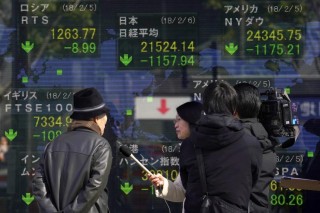Loading
Search
▼ Nikkei Ends at Largest Loss Since 2016 After Dow's Record Point Fall
- Category:Event
TOKYO - Tokyo stocks tumbled on Tuesday in a global stock rout with the Nikkei index posting its biggest decline since June 2016, on panic selling after the steepest single-day point drop on Wall Street overnight.
The 225-issue Nikkei Stock Average ended down 1,071.84 points, or 4.73 percent, from Monday at 21,610.24. The decline was the largest since the index dropped 1,286.33 points in June 2016 and the closing level was its lowest since Oct 23.
The broader Topix index of all First Section issues on the Tokyo Stock Exchange finished 80.33 points, or 4.40 percent, lower at 1,743.41.
Every industry category in the main section lost ground, led by metal product, nonferrous metal, and rubber product issues.
Foreign investors, who accounted for nearly 70 percent of trading on the Tokyo bourse, rushed to unload Japanese stocks to make up for losses from the U.S. stocks as well as on U.S. Treasurys, brokers said.
Market players dumped their stocks in panic after seeing the Dow Jones Industrial Average mark its biggest-ever daily point loss and U.S. 10-year Treasury yields sharply rose, said Maki Sawada, vice president of the investment research and investor services department at Nomura Securities Co.
"The sell-off accelerated in a chain reaction," she said.
Share losses widened in the afternoon, prompted by a further drop in U.S. stock futures and weak Asian markets.
"Selling accelerated as Dow futures extended declines (during Tokyo trading hours) and concerns grew that U.S. equities will continue to fall tonight," said Makoto Sengoku, a market analyst at the Tokai Tokyo Research Institute.
Investors had cheered stock markets' Goldilocks environment --solid economic expansion, improving corporate earnings and a relatively low long-term interest rates. But share prices saw large falls recently as the upward trend changed, triggered by the surge in U.S. Treasury yields.
"It is difficult to say whether the recent stock losses will affect real economies quickly, but investor sentiment actually cooled," Sengoku said, adding he is concerned about the economic growth outlook and a possible slowdown in domestic consumption if shares continue to fall.
"But I think the sell-off was a not-bad position adjustment as prospects grew that the Bank of Japan will persistently carry out its monetary easing policies" to support the market, Sengoku said.
Meanwhile, Nomura Securities' Sawada said the downward trend is expected to be short-lived. "The recent nosedive is not expected to last long as economic growth and domestic earnings remain solid," she said.
© KYODO
The 225-issue Nikkei Stock Average ended down 1,071.84 points, or 4.73 percent, from Monday at 21,610.24. The decline was the largest since the index dropped 1,286.33 points in June 2016 and the closing level was its lowest since Oct 23.
The broader Topix index of all First Section issues on the Tokyo Stock Exchange finished 80.33 points, or 4.40 percent, lower at 1,743.41.
Every industry category in the main section lost ground, led by metal product, nonferrous metal, and rubber product issues.
Foreign investors, who accounted for nearly 70 percent of trading on the Tokyo bourse, rushed to unload Japanese stocks to make up for losses from the U.S. stocks as well as on U.S. Treasurys, brokers said.
Market players dumped their stocks in panic after seeing the Dow Jones Industrial Average mark its biggest-ever daily point loss and U.S. 10-year Treasury yields sharply rose, said Maki Sawada, vice president of the investment research and investor services department at Nomura Securities Co.
"The sell-off accelerated in a chain reaction," she said.
Share losses widened in the afternoon, prompted by a further drop in U.S. stock futures and weak Asian markets.
"Selling accelerated as Dow futures extended declines (during Tokyo trading hours) and concerns grew that U.S. equities will continue to fall tonight," said Makoto Sengoku, a market analyst at the Tokai Tokyo Research Institute.
Investors had cheered stock markets' Goldilocks environment --solid economic expansion, improving corporate earnings and a relatively low long-term interest rates. But share prices saw large falls recently as the upward trend changed, triggered by the surge in U.S. Treasury yields.
"It is difficult to say whether the recent stock losses will affect real economies quickly, but investor sentiment actually cooled," Sengoku said, adding he is concerned about the economic growth outlook and a possible slowdown in domestic consumption if shares continue to fall.
"But I think the sell-off was a not-bad position adjustment as prospects grew that the Bank of Japan will persistently carry out its monetary easing policies" to support the market, Sengoku said.
Meanwhile, Nomura Securities' Sawada said the downward trend is expected to be short-lived. "The recent nosedive is not expected to last long as economic growth and domestic earnings remain solid," she said.
© KYODO
- February 6, 2018
- Comment (0)
- Trackback(0)


